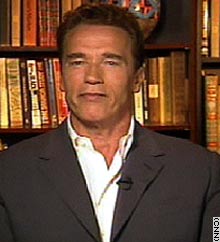
Actor Alec Baldwin slammed the filmmakers of "Running With Arnold," for which he was a narrator, and asked them to take his voice out. Baldwin, after seeing the film, wants his voice removed because the pseudo-documentary pictures Arnold Schwarzenegger in connection with images of Nazi rallies.
Baldwin was horrified when he went to record his dialogue and saw footage of Nazi rallies and information linking friends of Schwarzenegger and his father to the fascist party included in the film. His father was a local police chief, so it's probably all taken out of context.link
The fact is
Schwarzenegger's father was in fact a member of the Nazi party (specifically a member of the Sturmabteilung),
But,
Schwarzenegger has been a strong supporter of various Jewish groups, and has denounced the principles of the fascist German regime, saying "I have always despised everything that Hitler stands for"wiki
The son has nothing to with the crime of his father.
He was lucky living in the US.
In Korea
Roh already set the process in motion with a high-profile example: the chairman of his Uri Party, Shin Ki-nam, was revealed to be the son of a collaborator, a police official, and was forced to resign from the party.
In other words, Roh's intention is to put the descendants of the pro-Japanese collaborators before the Korean court of public opinion because of their ancestors' wrongdoings. And the "court" is very anti-Japanese. The potential, probably the certain, verdict would be humiliation and loss of face; and while the individuals probably would not be barred from public office or pubic life, they might find the public exposure too painful. Most of the descendants happened to fall in the category of conservatives - who have opposed Roh - in today's Korean ideological dichotomy and political tug-of-war. These are the people who have long cherished the prestige and power established by their ancestors though their collaboration with the Japanese occupiers.
To condemn them for retaining their inherited wealth and status is somewhat like charging the descendants of the Rockefellers, Carnegies, and others in the United States (who plundered its wealth as the nation industrialized) and denouncing their economic and social well-being today by blowing out of proportion their ancestors' illegal and unjust way of gaining their wealth. But even the American robber barons were not like the Japanese occupiers.asia Times
See also Anti-Japanese Xenophobia Continues/kalaniosullivan.com
Korean people might as well publicize 300,000 Korean young men who voluntarily applied for Japanese Imperial army. I wonder how many Koreans are not descendants of them.
No comments:
Post a Comment